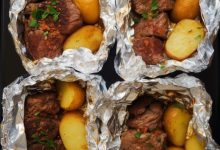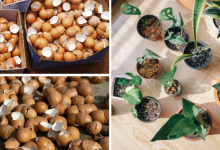There is plenty of kitchen mistake you’re probably making. Especially, some of your cooking and cleaning routine putting could damage your kitchen.
Putting Out A Grease Fire With Water

It may feel counter-intuitive, but dousing a flaming tray of broiled chicken thighs with water can only make things worse. Water and oil don’t mix. Worst case: The water will sink below the oil and become super-heated into a powerful blast of steam, adding oxygen and projecting the burning oil outward and upward into a raging fire. Your goal is to deprive the flames of oxygen by smothering them.
Try covering the pan with a large pot lid, a damp kitchen towel, or something similar that can cut off the air to the fire. A Class B chemical fire extinguisher also works, of course, but it will make a mess, so employ one according to the severity of the fire. As for baking soda and baking powder classic kitchen fire remedies, they’ll work, but you need a lot of them.
Feeding Potato Peels Down The Garbage Disposal

Potato peels contain a lot of starch, which can clump into a thick paste and clog the disposal. Also, peels sometimes pass through the disposal intact and collect in other parts of the piping, creating a hard-to-dislodge block. Artichoke leaves are also no-goes. Their tough fibers can get caught in disposal blades.
The better way: Compost potato peels and artichoke leaves or dispose of them in the household trash.
Leaving Lemon Juice On Granite And Marble Countertops

Acids like citrus juice, vinegar, wine, tomatoes, and soft drinks can stain and sometimes even etch the surface of granite and marble countertops. So wipe up spills as quickly as possible. Once the damage is done, your only recourse may be to have the surface re-polished by a professional. Some (though not all) granite surfaces benefit from a sealer. It won’t guarantee that your surface will be stain-proof, but it can give you some extra time to wipe up the mess. Check with a professional before choosing and applying a sealer; the wrong choice could damage instead of protecting the surface.
Not Scraping Dishes Before Putting Them In The Dishwasher
No, you don’t have to wash or even rinse the dishes before they go into the machine. But tossing dirty plates into the rack with large stuck-on bits of meatloaf or rice can clog a dishwasher’s pump assembly, drain lines and spray arms. This in turn can cause bacteria to breed (yuck) and diminish or completely destroy the machine’s washing powder. Simply scraping, but not rinsing (the soap needs a little something on which to cling to work well!), is the right way to go.
Pureeing Hot Liquids In A Blender

Why so dangerous? Swirling hot liquid in a blender causes the liquid to expand, forcing it up and out of the top of the carafe, where it could potentially burn you and spray your walls and ceiling.
To prevent a geyser: Puree in batches, fill the blender no more than halfway and remove the center stopper from the lid and hold a kitchen towel over the opening instead.
Hacking Ice Off The Walls Of A Freezer

No matter how gentle your touch, never take a screwdriver (or any tool!) to a freezer in need of defrosting. There’s a good chance of cracking the machine’s wall, damaging the cooling system, and causing the coolant to leak literally just breaking your whole freezer.
If you have an older refrigerator model or a new one without an automatic defrost feature, follow these simple steps: First, remove the food and transfer it to a cooler (or cook and eat it!). Turn off the freezer, and set a tray to catch the draining water. (It wouldn’t hurt to protect your floor with towels, as well.) Put bowls of lukewarm water in the freezer and wipe away melted water at 20-minute intervals, closing the freezer door in between each.
But please do not use a hairdryer to melt the ice. You don’t need to be reminded that dripping water on an electric appliance is dangerous.
Using A Damp Kitchen Towel As A Potholder

Water is a fast conductor of heat; much faster than air. If you use a wet towel or oven mitts to remove that hot lasagna from the oven, the heat from the baking dish will transmit quickly to your hands. It’ll cause a painful burn and could make you drop the baking dish and break it. The best bet: dry mitts and towels, or try a silicone mitt or potholder.






